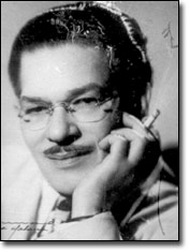A story on the forerunner of soap operas to narrate the Cuban Republican age
- Submitted by: admin
- Arts and Culture
- Caribbean
- culture an traditions
- Destinations
- history
- Literature
- national
- personalities
- 02 / 14 / 2009

González recalled moments from the childhood of the creator, who was born in a wealthy family but after the fire in their coffee plantations as part of the war of independence, became a very poor child from the Santiago neighborhoods, where he found close friends such as the Matamoros trio or the musician Electo Rosell (Chepín).
These friends gave music to his texts, he recalled, since he created songs, but he could not write music.
Talking about Caignet’s self-teaching, González pointed out that he was always an amateur and he would give himself a third grade, even though it is well known that when he was more than eighty years old he could read French perfectly well. González remembers his library with French newspaper serials from the 19th century, with a Wide spectrum of contents and qualities that nurtured him in order to create.
“A huge brain in a small culture, a man who knew how to take advantage of his moment at all times, who typifies the Cuban Republic,” commented González.
He pointed out that in Brazil there are about thirteen radio and television versions of El derecho de nacer, that have even been recently transmitted. Characters such as Mama Dolores, one of those slaves who breastfed the children of the masters together with her own, are very well known there.
According to the writer, in that relationship there was one of the most solid elements of trans-culture, since when they communicated the child their fears and happiness, they did too with their rhythms, their languages, and their respect for the Gods they had brought from so far away.
He remembered that white and black children would grow up together, in that mixture that would change them both and gave way to that “weird thing,” that mixture that are Cubans and that Caignet helps to understand.
The book has 268 images and also reconstructs the life of publicity, that permanent marketing operation that was the life of that author and of the Cuban communication media, that changed the landscape, the way of thinking, and the habits and made an affected language out of love and romance, he pointed out.
Tango, bolero and the tremendous peak of popular music was added to it. Radio was a cross-cultural mean and Caignet rode with those tides, said González.
In comparison to the North American Soap Operas the change that he introduced consisted in the fact that the narrator became yet another character from the drama, in an over flooded ecstasy, he pointed out.
In contrast to those that are shot in closed locations, Caignet took the drama to the Mountains in Oriente, to the fight of the mambises; to a brothel and to a convent.
He remembered that El derecho de nacer is the story of a child whose grandfather denies him that possibility and his black wet nurse rescues him, educates him and through the chances of the soap opera becomes a great and famous doctor who ends up saving the life of the old man.
The National Literature Award pointed out that in the book he deals with that soap opera like a constant and renewed marketing. Caignet was the first one to discover continuity as an element that hooks spectators, while there unfold all of the possible changes that life and the acceptance of the drama or the collateral events may propitiate it.
These pages reconstruct through images and crossed references from many writers: Alejo Carpentier, Emilio Roig de Leuchsenring, Rine Leal and Lisandro Otero, among other foreigners and Cubans, that evolution of the communication media.
González cited specifically La guerra del aire (The war of the air), that contributed to many getting rich, among them Caignet, and was settled between the magnates Goar Mestre, director of the CMQ and Amado Trinidad from RHC, two great opposing broadcasting companies. “There is all of it, you can follow Cuba’s life during that stage; there is our citizen Kane,” declared González.
(Cubarte)
Comments